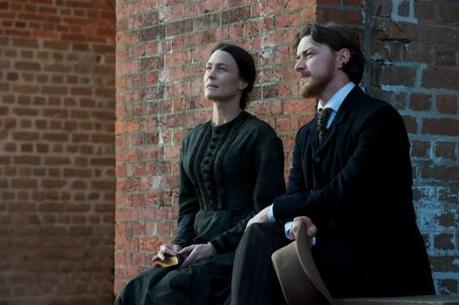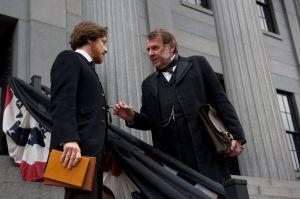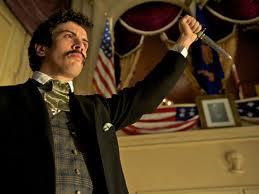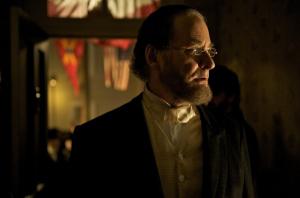
One of the things I love in reading and studying history is that it is usually both informative and unbiased. While there are certainly polemical perspectives on historical subjects and ideological approaches to historiography, most respected historical texts generally try to research a subject based on documentation and evidence, and then generally form an argument based on what that research supports or doesn’t support. Films, as works of art, generally speaking, are crafted from the opposite perspective – you start with an idea, lesson, thesis or argument and then typically craft a narrative to support that perspective. Each represents two entirely different methods of synthesis, for sure, though in historical films, these methods sometimes find themselves in conflict with one another. History has always been and will always be a prominent source for great dramatic storytelling in film and any dramatic medium. But certainly, it’s not always a happy marriage of content and form, and it’s a fairly common occurrence that dramatized films based on real life or historical incidents, even the best ones, can sometimes be highly inaccurate in regards to their subjects. Typically, creative liberties are taken with historical facts in order to create compelling and clear drama; this creative license, however, then mitigates the authenticity of the film. It’s a consummate Catch-22: you have to make a historical film entertaining to overcome the unfortunate prejudice that history is boring, and history as a popular discipline usually needs movies to makes sure certain historical subjects can enter and remain in the popular consciousness. Therefore, many times people gain the unfortunate misconception that they understand a historical event because they see a movie that depicts it.
In the best circumstances, a good historical film can elucidate a historical theme or lesson (and hopefully encourage a viewer to gain a better understanding elsewhere), but unavoidably certain elements of the subject will become biased, slanted, unrepresented, or outright fabricated. Last year’s The King’s Speech, while an extraordinarily compelling film, was deservedly chided in many quarters, most notably by Christopher Hitchens, for its gross historical inaccuracies. Nevertheless, it still won Best Picture of the Year at last year’s Academy Awards.
Robert Redford’s recent film The Conspirator has had nowhere near the cultural impact of The King’s Speech and will not frankly deserve Best Picture consideration, but it also stands, in another way, as an example of the very problematic process that sometimes develops in trying to portray a historical subject in a dramatized feature film. The Conspirator was the first film produced by financier Tom Rickett’s American Film Company, which, as its stated core purpose, “creates entertaining, engaging, and historically accurate feature films culled from American history.” The Conspirator certainly makes a game attempt at being an accurate view of an often overlooked moment in American history, but in the end, it falls into the same trap that undermines so many historical films due its willingness to compromise a good deal of its accuracy. In the case of The Conspirator, however, that compromise is less for the purposes of dramatic license, and more for the behest of a liberal political message. That, in and of itself, wouldn’t be a bad thing, provided the film was ultimately a compelling entertainment otherwise. Unfortunately, it’s not.
The Conspirator relates an incident from the aftermath of the assassination of Abraham Lincoln that, as mentioned, is too often overlooked: the case of Mary Surratt (Robin Wright), a middle-aged Confederate sympathizer whose role as the landlady for a number of the Lincoln conspirators led to her being accused of complicity in the assassination itself. Caught up in the national outrage and grief as well as the heightened tension and paranoia that existed in the final days of the Civil War, Surratt was one of many accused conspirators who, despite their standing as American citizens, were tried by an obviously biased and hastily convened military tribunal administered by the same Union War department that led the struggle against Confederate forces. The film’s main character is Frederick Aiken, played by James McAvoy, a former Union officer and young lawyer employed by Maryland Senator Reverdy Johnson (Tom Wilkinson). Though it is Johnson himself that initially takes on Surratt’s defense, believing that she deserved fair representation in a trial of her peers, he is soon forced to recuse himself due to his reputation for having compassion toward the South. Placed in charge of her case, the very pro-Union Northerner Aiken soon finds himself overcoming his own ardent belief in Surratt’s guilt to defend her, as best he can, in an unethical tribunal designed to mead out swift justice and retribution. Belong, Aiken’s devotion to his cause leads to him becoming ostracized from his friends, also former Union officers, and the local political community. The trial Surratt is subjected to proves to be a tragic farce, presided over by officers handpicked by the Secretary of War Edwin Stanton (Kevin Kline), which uses perjured witness and essentially makes up its own rules as the “trial” progresses. Aiken begins to suspect that the government is using Mary Surratt’s life as leverage to lure her son John, one of Booth’s chief conspirators, out of hiding, all of which leads him to question exactly what it was he nearly gave his life for in the War.

Redford and his collaborators, perhaps rightfully, make no real case for whether Mary Surratt was either innocent or guilty of the crimes attributed to her. Historians debate her culpability in the assassination to this day, though it’s been pretty well established that she was undeniably devoted to the Southern cause and very likely aided her son’s career as a Confederate spy. What happened to her after the Lincoln assassination, however, remains a miscarriage of justice as practice if not necessarily in result; the film, at its most basic level, astutely and convincingly emphasizes its point that trial by jury is a guaranteed right, regardless of its outcome. Given the complexity of the story and many of the emotional, political, and philosophical issues inherent in it, Redford and the American Film Company deserve a great deal of credit in their attempt to communicate it to the masses. But it is in choosing to present history in what turns out to be precisely allegorical terms where certain flaws unavoidably develop that compromise the film.
The Conspirator itself is a fairly obvious allegory of the modern use by the U.S. government of military tribunals to try suspected terrorists and conspirators in the War on Terror, a political argument that I more or less agree with. Now on the surface, there are certainly many comparisons one can make between Lincoln’s assassination and the terrorist attacks of 9/11. Both had a detrimental effect on the United States and both engendered a state of national mourning and extreme paranoia in the nation at large. The long term aftermath of each were certainly far more negative than positive: Lincoln’s death led to the ascension to the Presidency of the controversial Andrew Johnson, a Southern sympathizer and bigot whose mangling of Reconstruction almost certainly sent the South toward Jim Crow and set back Civil Rights for almost a century (Johnson himself famously escaped impeachment by a single vote in the Senate). Similarly, the pain and damage of the post-9/11 era to the national consciousness and international standing probably doesn’t need any reemphasis.
A problem ultimately remains that the two events still have fundamental differences, and one does not necessarily engender precise similarities to the other. The Lincoln Assassination came as an aftershock to a nation still reeling from a Civil War that claimed almost 600,000 lives, while September 11 occurred after a period of relative prosperity. Certainly, while the trial of Mary Surratt was certainly a miscarriage of justice, it remains difficult for me, even now, to ultimately judge the Union officials too harshly given their circumstances. Much of what was done then was wrong, and sometimes inhuman (the men suspected in the assassination plot were forced to wear heavy wool hoods without eyeholes over their heads at all hours of the day and were never allowed to bathe), but they were still at the tail end of a brutal war, and didn’t yet have countless global wars, a bevy of state-supported genocides, and Geneva conventions to instruct them in the error of their ways.

"Sic semper tyrannis...the South is avenged!" The film's portrayal of Lincoln's assassination and its immediate aftermat may have been its most effective aspect.
That’s something of the problem with The Conspirator at the end of it all: the film, despite its obvious meticulous research and its depth, often feels almost too decisive and derisive against itself, as if it wants to make the easy points but at the same time isn’t completely sure of its own convictions. It’s an example of the aforementioned method of starting with an idea and fitting the story to support an idea; The Conspirator was created by fitting history to art; starting with the thesis and then contouring the historical record to fit the argument. As a result, it ignores certain points and unintentionally raises others, and thus compromises itself. It wants us to care for Mary Surratt’s fate, but it also wants us to also be sure that it isn’t seen as being too sympathetic towards her (a delicate balance that might have been possible, but here isn’t really successful) And in its efforts to present its case it creates a polemic divide that can be contradictory to the real events of history.

Kevin Kline as Edwin Stanton, Lincoln's Secretary of War and the film's surrogate antagonist.
As a case in point, the film is pretty unfair in its portrayal of Edwin M. Stanton, Lincoln’s Secretary of War. As characterized by the filmmakers and performed by Kevin Kline, Stanton is made into a painfully obvious surrogate of Dick Cheney; he’s distant, manipulative, intelligent, and able to elucidate his point well, even if he’s fairly coldblooded while doing it. Stanton, in real life, was certainly not a saint, and deserves to be criticized for his actions in his treatment of the conspirators, but he wasn’t someone with the notoriety of Dick Cheney. Stanton was an integral figure in the victory of the Union forces and was perhaps the most loyal disciple of arguably America’s greatest President, and remained one of the staunchest defenders of Lincoln’s agenda during the Johnson administration (so much so Johnson tried to fire him – one of the maneuvers that precipitated his attempted impeachment). There is a scene in the film that I thought was very telling of its agenda: after John Wilkes Booth’s attack on Lincoln, it accurately shows Stanton taking over control of the government due to the crisis while only one room away from the dying president. However, it then doesn’t portray the famous, character defining moment where he broke down into tears after Lincoln finally passed the next morning, and where he delivered the immortal lamentation for the fallen President, “and now he belongs to the ages.” To me, the film would have been better served to portray that human side of Stanton rather than shoehorn him into being Cheney’s surrogate; it would have reemphasized the complexity of its own issue while eventually still coming to the same result. In the end, The Conspirator becomes so concerned with its own thesis that it too often avoids being dialectical, which I think only would have supported its own argument, if perhaps not its agenda.

Mrs. Mary Surratt (Robin Wright), The Conspirator's eponymous character, whose ultimate guilt remains to this very day, highly uncertain.
From a qualitative viewpoint, the film remains solid and intelligent in its dialogue and most of its characterization. The cast, while a very impressive “who’s who” of major actors, unfortunately feels like a mixed bag as an ensemble. Robin Wright gives a fierce and strong performance as Mary Surratt, and helps us feel some emotion toward a proud woman who in the end still remains something of a dubious enigma to us. Tom Wilkinson, Colm Meaney, Kevin Kline, and Danny Huston (who at times sounds frighteningly like his father John) do very well as the “old guard” of performers, imbuing their parts with weight and intelligence. Conversely, Alexis Bledel and Justin Long feel anachronistic and out of their depth as Aiken’s increasing estranged wife and old war buddy, respectively. James McAvoy and Evan Rachel Wood (as Surratt’s daughter) fall firmly in the middle; they’re both good and competent, but they don’t convey the depth and screen magnetism necessary to completely carry their characters through the sometimes laborious film.

A miscast Alexis Bledel playing Aiken's wife Sarah. The fact that there is no natural lighting source that should be illuminating her like that also kind of sums up the cinematography in a nutshell.
Though there are moments where The Conspirator feels refreshingly old fashioned in its style and tone, it’s also incredibly stolid and at times really slowly paced. The film sometimes appears as too much of an obvious reenactment than a realistic film: wigs look like wigs, costumes look like costumes, and the sets look more like historical recreations than anything that may have actually been lived in. Much of the cinematography and lighting also appears painfully forced and obvious in its symbolism. The biggest problem, however, is that while the film makes its intellectual point with clarity and poignancy, it makes it very early on, leaving the film ultimately with nowhere to go as it moves gradually towards its conclusion. Its best moments really come early on, as it convincingly captures the grief the nation felt over Lincoln’s death; afterward it kind of develops a real sense of distance from any emotional core of it might have had. That’s part of the tightrope the film tries to walk; in portraying the case entirely from the perspective of Surratt and Aiken, after awhile, there really isn’t anywhere for it to go, and the film never really generates any suspense that it will go anywhere other than where you think it will. From my own personal perspective, the real tragedy of the story was for the Unionists like Stanton, having fought to maintain their country while rejecting the ideals that their country was based on. With more shared emphasis on that aspect of the film, The Conspirator might have been far more compelling and lively, and provided a more comprehensive view of its subject and taught a valuable and contemporary lesson. Regrettably, it has all the excitement, predictability, and clarity of a march to the gallows. On a certain level, though, that may not be entirely inappropriate.

